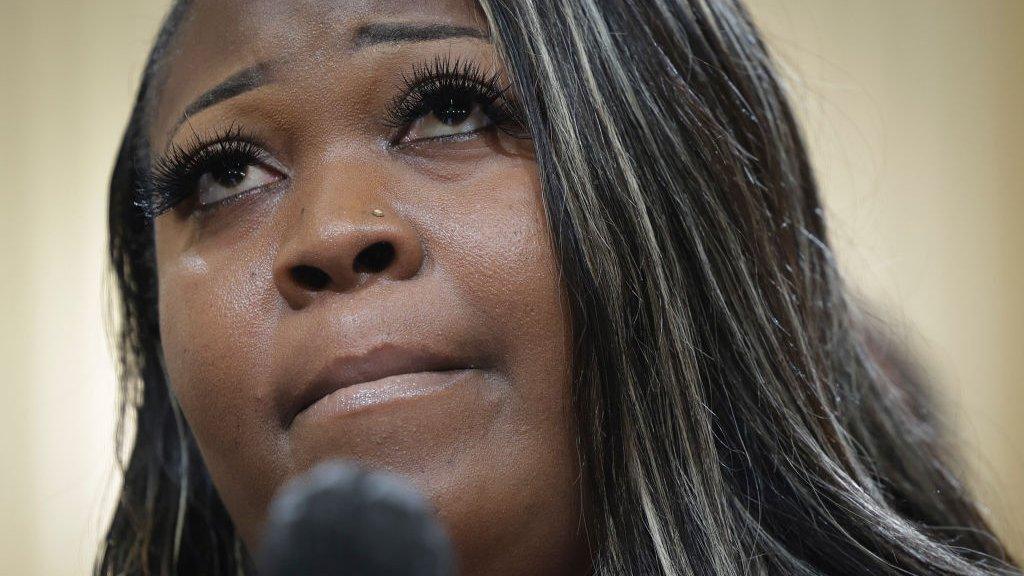Capitol riots: 'Wild' Trump tweet incited attack, says inquiry
- Published
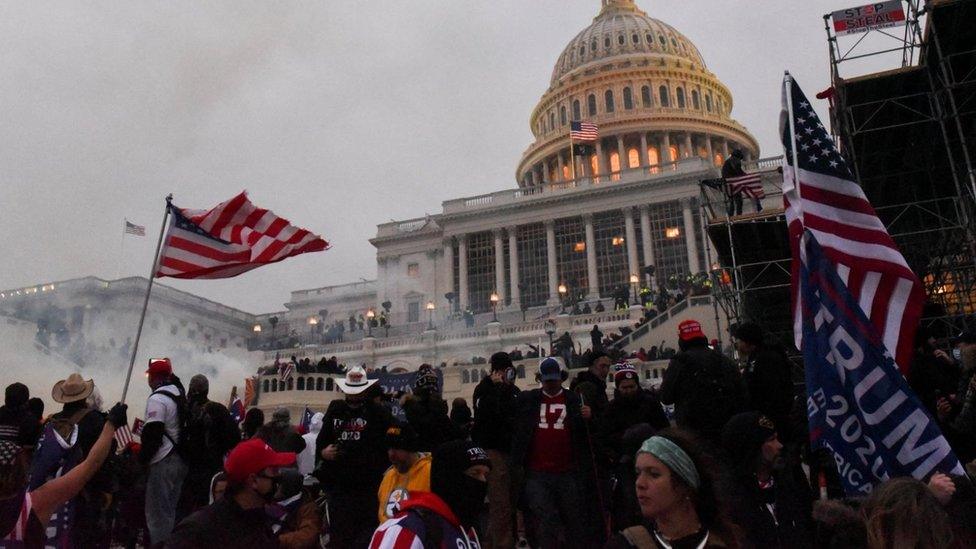
Donald Trump's supporters stormed the Capitol on 6 January 2021
A Trump tweet mobilised far-right extremists to converge on Washington DC on the day of last year's Capitol riot, a congressional inquiry has heard.
He posted the tweet after "the craziest meeting of the Trump presidency", said a lawmaker on the panel.
The then-president forged ahead with a rallying call to supporters even though aides repeatedly told him he had fairly lost the 2020 election to Joe Biden.
The committee accuses Mr Trump of an attempted coup to remain in power.
Supporters of Donald Trump violently stormed Congress on 6 January 2021 as lawmakers met to certify Mr Biden's victory.
Hours before the hearing, Mr Trump, a Republican, dismissed the Democratic-led House of Representatives panel on his Truth Social social media platform as "Political Hacks and Thugs" perpetrating a "HOAX".
The select committee has been conducting a nearly year-long investigation into the attack on the Capitol. Tuesday's hearing, the seventh since June, focused on a tweet Mr Trump sent in the early hours of 19 December 2020, and a stormy six-hour meeting at the White House that preceded the post.
Jamie Raskin, a Maryland Democrat on the committee, said the meeting had been described as "unhinged" and "not normal".
Mr Trump had already been told by White House aides and figures within his own campaign team that he should concede to Mr Biden, a Democrat.
However, on 18 December he welcomed to the White House some informal advisers who had been urging him to pursue his unfounded claims of widespread voter fraud.
The group - which included his personal lawyer Rudy Giuliani and his ex-National Security Adviser Michael Flynn - had suggested Mr Trump order the military to seize state voting machines.
Aides push back
The meeting was intercepted by aides, as well as then-White House counsel Pat Cipollone.
"I don't think any of these people were providing the president good advice," Mr Cipollone said in recorded testimony to the select committee.
What followed was hours of argument, during which Mr Cipollone said he was attacked "verbally", but kept "pushing back", asking the group: "Where is the evidence?" They did not offer any proof, he and other aides told the committee.
Former aide testifies: Trump said ’take me to the Capitol’
The meeting ended after midnight with the idea of seizing ballot boxes rejected. Mr Trump's tweet - sent at 01:42 local time - told supporters: "Statistically impossible to have lost the 2020 Election. Big protest in D.C. on January 6th. Be there, will be wild."
The post, Mr Raskin argued, "electrified and galvanised his supporters", who believed Mr Trump's claims that the election had been stolen from him.
The panel says the tweet was the siren call to extremist groups such as the Oath Keepers and Proud Boys to turn up. Two members of the groups are awaiting trial on rare seditious conspiracy charges related to the Capitol riot.
An anonymous Twitter employee told the committee they saw a rise in violent rhetoric online following the tweet. Mr Raskin said some of the responses turned "openly homicidal".
Committee members are trying to draw a direct line between the social media post and the violence on 6 January. The panel is seeking to build a case that Mr Trump's efforts to overturn his defeat in the 2020 election constitute illegal conduct.
Tuesday's hearing was also told of a claim that Mr Trump attempted to contact someone who was talking to the congressional inquiry, raising the possibility of witness tampering.
Liz Cheney, one of two Republicans on the committee, said they had notified the justice department.
The Wyoming congresswoman said the person Mr Trump had tried to contact did not answer his call and instead alerted a lawyer.
Another witness who testified on Tuesday was Ohio man Stephen Ayres, who has pleaded guilty to participating in the attack on the Capitol.
Ayres stunned people in the hearing room when he approached two of the police officers who were injured in the melee and shook their hands. More than 140 officers were hurt in the riot.
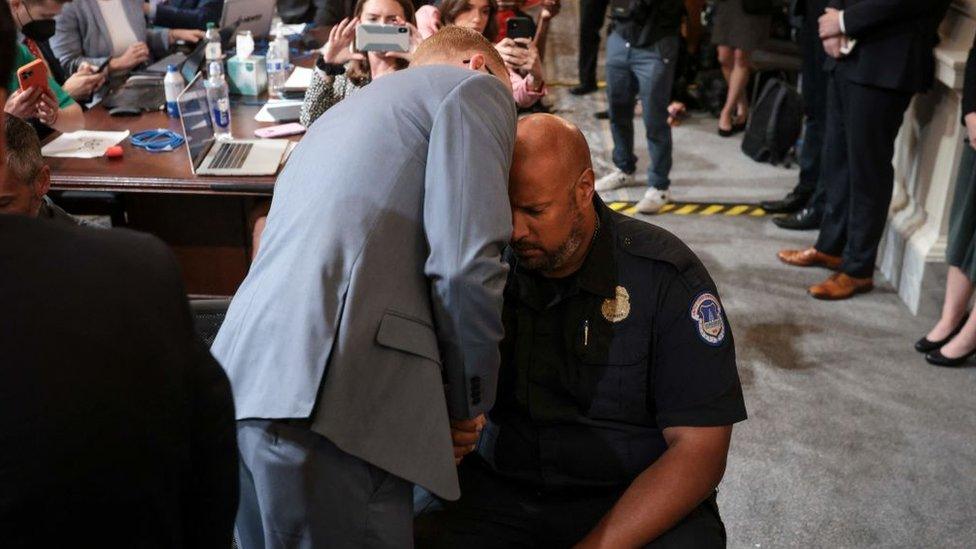
Stephen Ayres shakes the hand of Capitol police officer Harry Dunn after testifying
One of the policemen, Harry Dunn, described the exchange to the BBC's Tara McKelvey, who attended the hearing.
"He apologised," Mr Dunn said, shaking his head. "I'm trying to process."
Mr Trump - who has hinted he may run for the White House again in 2024 - has described the hearings as an attempt to distract Americans from the "disaster" of Democratic governance amid rampant inflation.
A New York Times opinion poll this week found just 33% of voters approve of President Biden, lower than Mr Trump's popularity in the aftermath of the Capitol riot, according to Gallup.
- Published9 June 2022
- Published29 June 2022
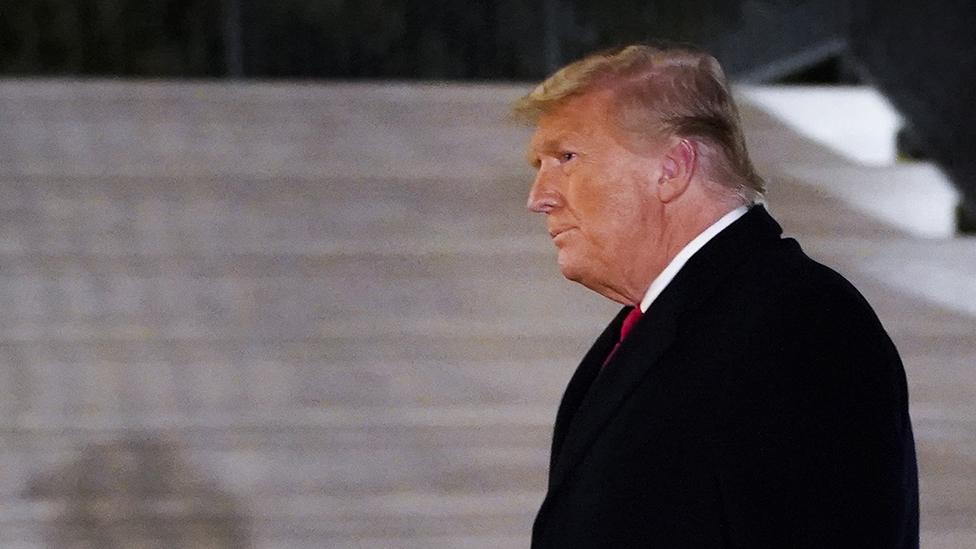
- Published2 August 2023
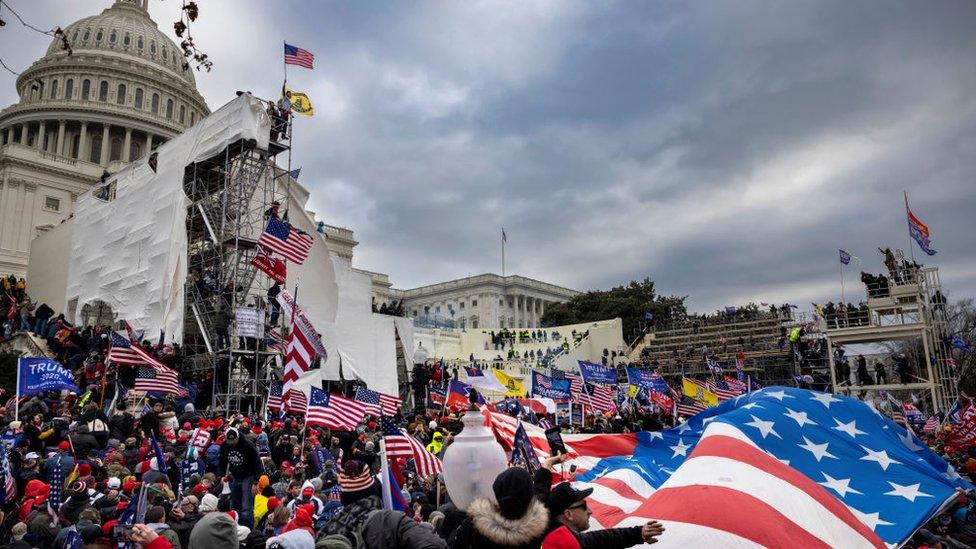
- Published21 June 2022
